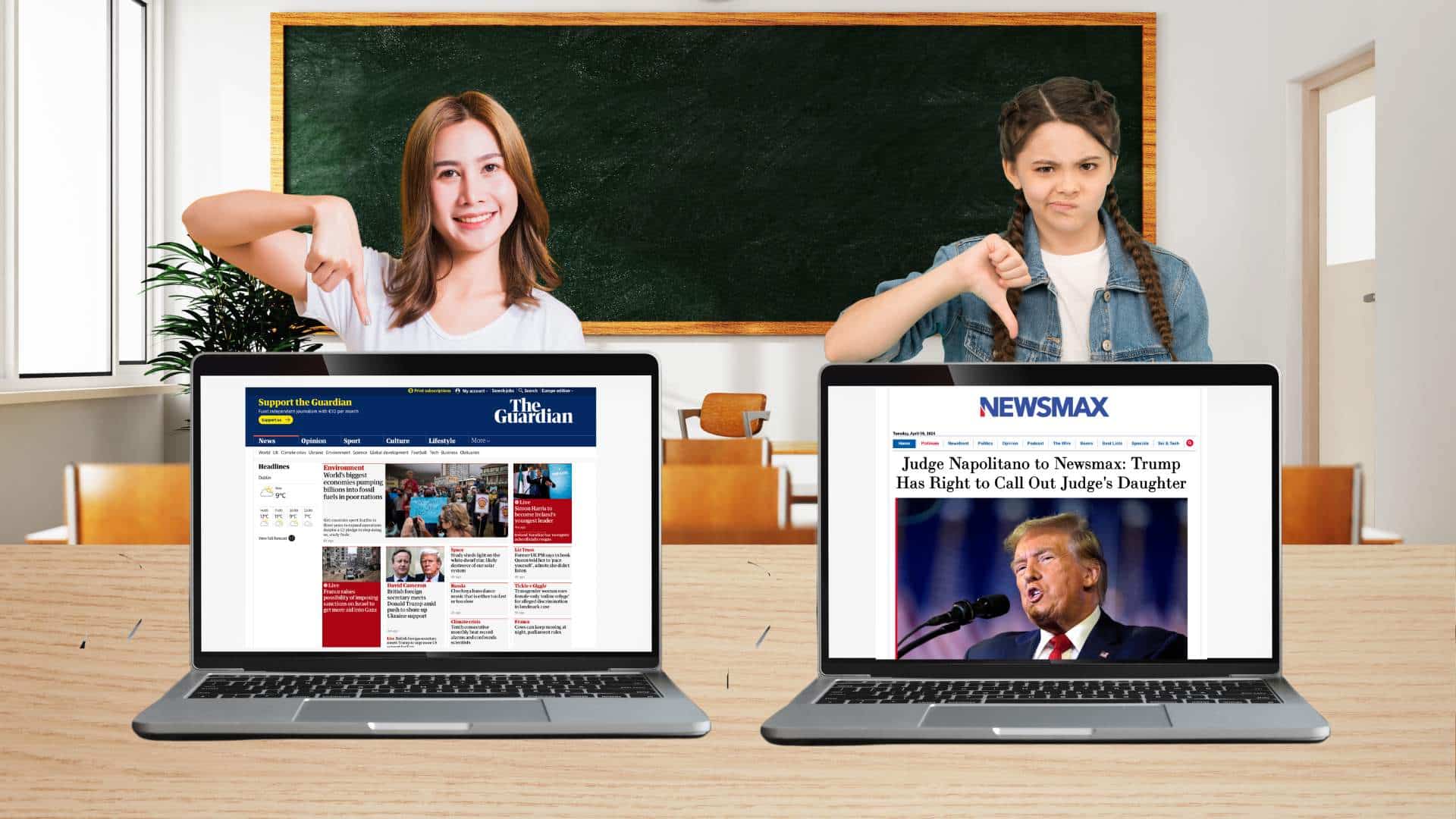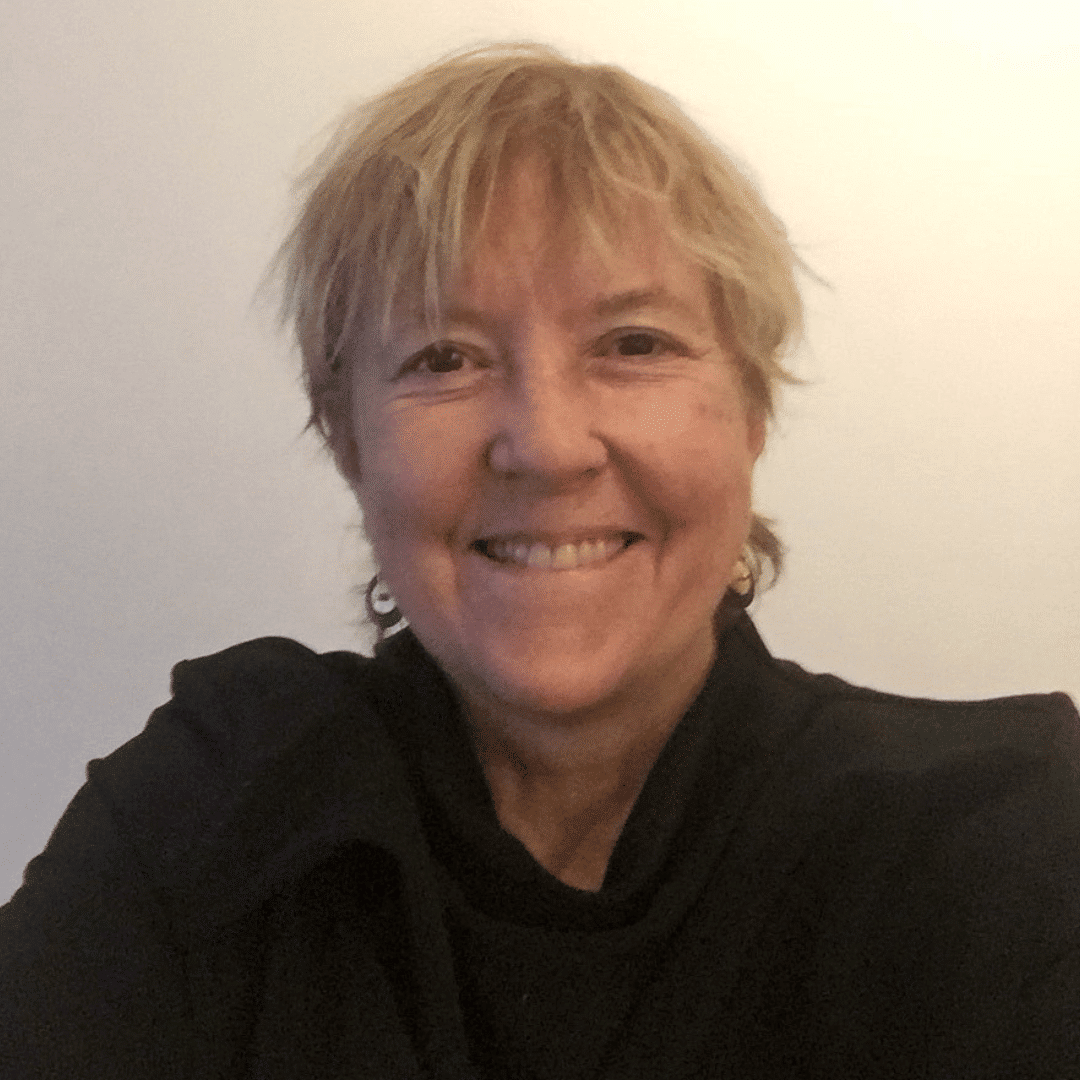News and media literacy groups are calling on Europe to include journalism in media literacy education. Students need to know how to spot news they can trust.

A teen points to a site that can be trusted while another gives a different site a thumbs down. Illustration by News Decoder.
When schools teach children and teens in Europe media literacy to protect them in the digital world they also need to teach them about the necessary role of journalism. That’s the argument of more than two dozen supporters of journalism and providers of media literacy in the region.
On 11 April they jointly submitted additional language for a draft checklist of European standards for media literacy in response to an invitation for input by the drafters of the standards, a working group at the European Digital Media Observatory (EDMO).
The group’s initiative calls for taking into account “the necessary role of journalism in European democracy,” specifically that:
- Journalism differs from other content due to its codification as important for the success of a democratic form of government.
- This form of information puts an emphasis on ethical practice and verification to inform the public.
- Understanding the elements of the ethical journalism that produces quality content also contributes to the ability to decipher the nature of other content.
- It is important to explore the judicial, political and physical attacks some journalists face just to do their jobs.
Because of the increasing hostility toward journalism and those who do it, the group argues that such lessons need to be included in core media literacy curricula, especially given journalism’s codification in EU legislation — most recently in the European Media Freedom Act — as having a key civic role.
Differentiating between journalism and polemics
News Decoder is one of the supporters of the suggested language.
“You can’t teach media literacy without teaching an understanding of journalism and its principles,” said Marcy Burstiner, News Decoder’s editorial news director. “The only way to combat disinformation and misinformation is for young people to understand how to differentiate credible sources from those that shouldn’t be trusted. They need to know the standards and protocols that ethical journalists follow.”
Journalism and the work journalists do is underappreciated around the world, she said. “Young people also need to know that the gathering and reporting of accurate information that questions government and authority is often difficult and dangerous,” Burstiner said. “You can’t be media literate without understanding that.”
Other support for the additional language comes from individuals with media literacy credentials as well as institutions supporting democracy, journalism and media literacy within Europe and beyond.
Mogens Schmidt, former UNESCO assistant director general for communication and information and former director of the European Journalism Centre is one of the individual supporters.
“I sincerely endorse these very pertinent recommendations on teaching media and information literacy in all levels of education,” Schmidt said. “Today journalism is constantly under pressure from mis- and disinformation, and teaching children and youth to recognize professional journalism is more important than ever.”
Children’s News Europe and Global Youth & News Media jointly organized the initiative.
“We salute the approach the EDMO working group has taken,” said Josh LaPorte, media literacy adviser at Global Youth & News Media. “The draft is clear and practical. We strongly believe our suggestion will insert a key democracy-reinforcing element.”
Teaching critical media consumption early
Children’s News Europe member Sonja Merljak Zdovc, editor of Časoris in Slovenia, argued that those lessons need to start early with children.
“This way we can hope that when they become teenagers, they will develop a habit of using reliable sources of information and when they see something dubious on YouTube or TikTok they will know where to double check their facts,” Zdovc said.
Institutional supporters of the additional language include both regional and national providers of media literacy instruction, such as the Macedonian Media Institute, France’s Association pour l’Education aux Médias (APEM), Nieuws in de klas (The Netherlands), Finland’s Media Kasvatus, Ireland’s PressPass and the Belgium-based regional nonprofit Lie Detectors.
“Media literacy stems from a better understanding of the necessity of journalism, its practices and its role in society,” says Etienne Millien, director of APEM.
To Millien, understanding journalism is understanding why we need news and how to access it in the best way possible.
“Information is a common good, shared by all citizens in a democratic society,” Millien said. “Understanding journalism is understanding how to safeguard democracies against inner and exterior threats, be it corruption, manipulation or disinformation.”
Teaching how journalism matters
Anne Browne, who has taught Ireland’s PressPass media literacy program for six years to Irish 16-year-olds, also sees it as a key activity. “Teaching our students that journalism matters and the reasons why is a key responsibility of teachers in a European context today,” she said.
In Northern Macedonia, such basics are taught throughout the country’s primary schools.
“We help educators teach children why journalism matters, how journalists work and what are the ethical standards they follow,” says Biljana Petkovska, Director of Macedonian Institute for Media, which runs the “You Think” program.
“Our approach helps students learn about the difference between facts and opinions, the importance of freedom of expression and ethical behavior in journalism, while learning to discern hate speech and disinformation,” Petkovska said.
Major pan-European journalism entities have also expressed support, including the European Journalism Centre, the European Federation of Journalists that represents more than 300,000 journalists and the European Journalism Training Association that unites more than 80 educational entities.
“The importance of independent journalism for our increasingly fragile democracies must be better explained,” says Renate Schroeder, director of the European Federation of Journalists.
“Why do we need the watchdog role of journalists and why is journalism expensive?” Schroeder asked. “What differs journalistically-produced information from any comments on social networks, which often spread faster than facts but are not based on independent research and analysis?”
Literacy competence includes information from news.
Communications scholars also see the need for teaching such basic lessons.
“Journalism is a profession under pressure – culturally, economically and politically,” said Mark Dreuze, media studies professor at the University of Amsterdam. “It is a crucial literacy competence to understand and appreciate what goes into professionally producing news and information that is of public value, verified by practitioners committed to uncover the truth.”
Support is also coming on the international level, including from the Global Forum for Media Development, which unites 88 media development and journalism support organizations worldwide, the International Center for Journalists, which has long worked to build the expertise and digital skills journalists need to deliver trustworthy news, and the Media Diversity Institute, which encourages accurate and nuanced reporting on race, religion, ethnicity, class, disability, gender and sexual identity issues around the world.
“It is alarming that even policy makers in the field of media ignore journalism more and more while focusing on social media,” said Milica Pesic, executive director at the Media Diversity Institute.
“Yes, one could say — and studies show it — that the news media are not anymore the gatekeepers of the news, that role prevailingly taken over by social media,” Pesic said. “But without good journalism / public interest journalism it is democracy which is at stake, thus the importance of learning about journalism as media literacy Lesson Number 1.”
Understanding where information comes from
The working group formed by the EDMO established has collaborated widely and regularly to get input to help it hone the draft media literacy standards. Its overall goal is “to raise media literacy levels across Europe, by developing quality standards, guidelines and best practices that new and existing practitioners can consult to increase the effectiveness of their projects.”
The project is managed by a consortium led by the European University Institute (EUI) School of Transnational Governance in Florence, Italy. The consortium includes the Athens Technology Center of Greece, Aarhus University of Denmark and the fact-checking organization Pagella Politica of Italy as well as 14 partner national hubs.
A full list of supporters and additional comments can be found here.
The EUI was founded in 1972 and is funded by its contracting states, the European Union (Erasmus+), and its own revenue drawn from competitive research funding, partnerships with public and private actors and executive education.
Paul Mahailidis, faculty chair and director of The Salzburg Academy on Media and Global Change in Austria, argued that at the core of their educational experiences, all media literacy initiatives need to include opportunities to learn news gathering and dissemination process, about news industries and the impact of technologies on news today.
“Strong understanding of news practices remains core to healthy civic society across the world, and knowing about journalism is paramount to media literate societies,” Mahailidis said.
Three questions to consider:
- Why should teaching media literacy not wait until high school?
- What media literacy skills could very young children be taught?
- Can you think of ways to teach media literacy in a math or science class?

Aralynn Abare McMane, is executive director of Global Youth & News Media, coordinator of Children’s News Europe and an advisor to News Decoder. Disclosure: For a very long time, she has been an advocate for exactly this kind of teaching, which is now honored by The Global Youth & News Media Prize for news/media literacy.
Read more News Decoder stories about media literacy:
